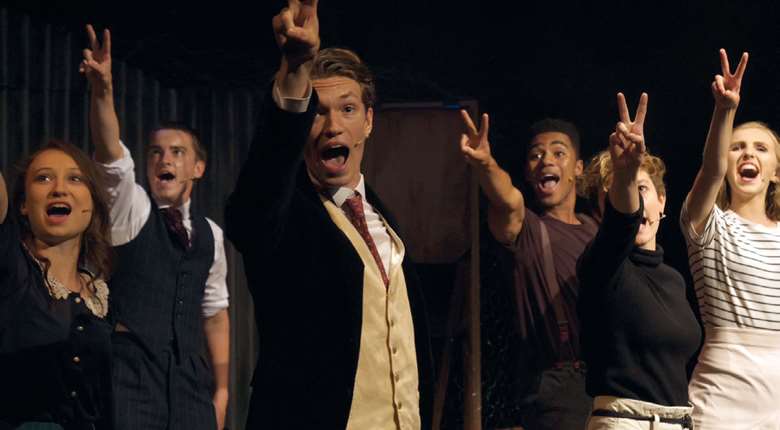Making theatrical history
Alex Thomas
Saturday, February 1, 2020
Alex Thomas relates how he came to write a jazz musical for his students, set in Nazi Germany

CALLUM JOHN
As a director of drama and teacher of history I enjoy an unusual but interesting combination of roles, with more overlap than one might expect. After all, plays are products of their time, even if they try not to be, and a healthy level of historical context can prove a very useful starting point in the rehearsal process. Similarly, play scripts and playwrights often provide a unique window into a historical period.
As a writer of musicals, I've been particularly conscious of the potential value in this overlap and this article will focus on one recent piece of writing which self-consciously aimed to exploit this potential.
I first came across the ‘Swing Kids’ while studying Nazi Germany for my own history GCSE and they still earn a brief mention on the syllabus as a rare example of non-compliance in German society under Hitler. They were teenage rebels who defied the Nazis by listening and dancing to banned ‘degenerate’ jazz music. Often from rather wealthy backgrounds, they wore elaborately English clothes, let their hair grow to louche lengths, and – more riskily – boycotted the Hitler Youth movement, which became compulsory during the war. Their ironic motto was ‘Swing Heil!’ accompanied by a Churchillian V-sign salute.
The Nazis had an uncomfortable relationship with jazz music because it enjoyed a huge popular following in 1930s Germany. Many senior Nazis were also great fans of the genre, with Goebbels owning a huge private record collection. But its Afro-American roots and the fact that many leading musicians were Jewish were problematic in view of Nazi racial theories. So Germany's dance halls were closed and many musicians emigrated or were taken to concentration camps.
But jazz did not die out: instead, like so many resistance movements, it went underground, literally. I loved the idea of these casually courageous Swing Kids living a secret nocturnal life in their bunkers and cellars, listening to outlawed records, often during bombing raids. I saw, in their story, a chance to bring alive a minor bullet point on the history syllabus, and so set some keen Year 11 historians the task to help unearth what we could in this niche area. Most books on Nazi Germany yielded little, but with persistence some fascinating nuggets emerged which they enjoyed presenting to the rest of the class.
Unearthing stories
The most intriguing character we encountered in our research was Hans-Jügen Massaquoi, the son of a wealthy African father and white German mother. He enjoyed an affluent childhood in Hamburg before the Nazis sent his father back to Africa, leaving the boy and mother penniless and friendless.
Young Hans-Jügen, acclimatising to his new life in a working-class slum, became (astonishingly) an enthusiastic Nazi, but was not allowed to join the Hitler Youth due to his colour. Increasingly frustrated, he ended up playing the saxophone in illegal jazz clubs and thereby fell in with the Swing Kids crowd, ultimately emigrating to America. But had Hitler let him, he would probably have been a very willing party member. The truth is rarely black and white, and it is often these quirks of humanity which make for the most interesting moments both on stage and in history lessons.
I also think that musical theatre works best when the music itself plays an integral rather than an incidental role in the story. With that in mind I decided to incorporate some actor-musician roles, and the score is largely consistent with the jazz styles prevalent in the early 1940s. There is something fresh and exciting about fast swing music, and it results in some very challenging choreography.
The final ingredient which made it feel like an ideal choice of subject was the age of the protagonists. It struck me during rehearsals for DNA last year how seldom school pupils get to play characters their own age, and (unsurprisingly) they were very good at it. There is something hard-hitting about 18-year-olds playing themselves, particularly when their characters’ lives are at stake.
A studio musical for young performers
So Swing Heil! was born, a studio-sized musical for a cast of eight and jazz trio accompaniment, which follows a group of friends through the summer of 1943 in Hamburg, culminating in the cataclysmic bombing raids which engulfed the city. The cast (largely non-historians) threw themselves into the story and much of the choreography in fact came from their own research into the dances of the period.
The show premiered in Oxford's Old Fire Station theatre on the 75th anniversary of the bombings, and I was particularly pleased when one former history pupil in the audience commented: ‘I'd heard of the Swing Kids, but had never thought about them properly before.’ So I'd encourage any of you thinking of writing a script to chat to a colleague from the history department: they might just have some useful stories up their sleeve.

